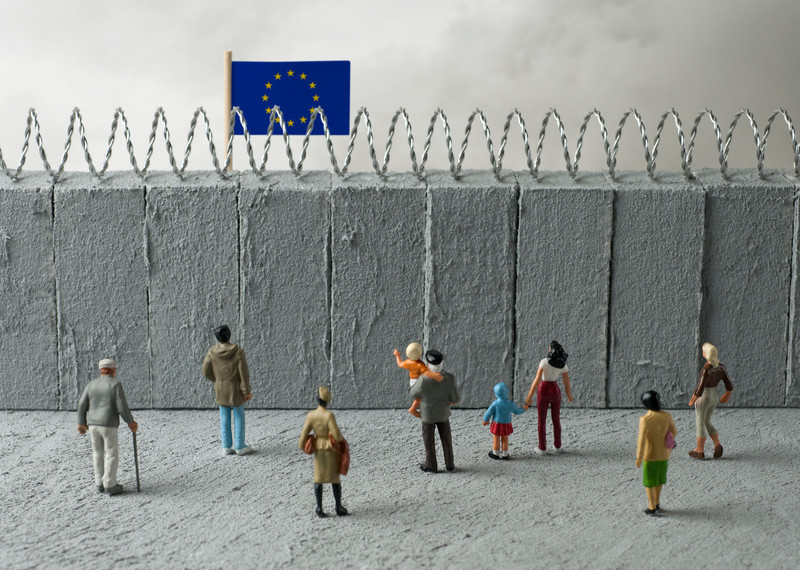This opinion piece was originally published here by Politico Europe
Eve Geddie is Director of Amnesty’s European Institutions Office.
As the representatives of so-called “Team Europe” were shaking Tunisian President Kais Saied’s hand this July, hundreds of refugees and migrants were stranded in the country’s desert border areas with Libya, after its security forces rounded them up and abandoned them there without access to food, water or shelter.
The European People’s Party President Manfred Weber later referred to these reports — including of multiple deaths near the border — as “some videos from the desert or something.”
European leaders were in Tunisia to sign a Memorandum of Understanding (MoU), aiming to curb migration to Europe. And in exchange they offered Tunisia €105 million for “border management,” and nearly €1 billion in additional loans and financial support amid the country’s unprecedented economic crisis.
However, while Tunisia and the European Union are discussing how to implement the deal, its human costs are already apparent. And as Europe turns a blind eye to the growing repression of human rights in the country, people in Tunisia — including asylum seekers, refugees and other migrants — are paying a heavy price.
European and EU leaders should urgently reverse course.
First, even after the agreement was reached, Tunisian authorities continued to force migrants to the Libyan border, where many languished in urgent need of humanitarian assistance, with international media reporting numerous deaths. Shockingly, EU leaders have yet to publicly condemn these violations.
Instead, the European Commission has committed to cooperating with the Tunisian authorities to prevent refugees and other migrants from reaching Europe, knowing full well that doing so will perpetuate the same violations — trapping asylum seekers, refugees and other migrants in abusive situations and contributing to the hostility they face in Tunisia.
Most worryingly, this agreement was signed with no human rights conditions in place, no assessment or monitoring of its human rights impact and no mechanism to suspend cooperation in case of abuse. The European Ombudsman announced last week that has requested that European Commission clarify how it will ensure that human rights will be respected by Tunisia.
It seems no lessons were learned from the EU’s cooperation with Libya, where the bloc’s support for Libyan security forces has made it complicit in an infrastructure of abuse against migrants and refugees, including torture, rape, enforced disappearances, unlawful killings and arbitrary detention. A recent U.N. investigation found that this may even amount to crimes against humanity.
Agreements aiming to contain people in non-EU countries don’t save lives, nor do they reduce people’s reliance on irregular routes. Rather, people on the move are forced to take more dangerous routes to avoid interception by authorities, while smugglers profit as refugees and other migrants increasingly rely on their services. Moreover, such agreements do nothing to resolve the problems that lead people to migrate in the first place, in search of safety or security, which will continue to occur regardless. It is disappointing therefore that in her ‘10-Point Plan for Lampedusa’ President Von der Leyen doubled down on the Tunisia deal.
Additionally, the EU’s agreement with Tunisia also risks legitimizing Saied’s assault on rule of law and his ever-increasing repression of dissent. In the lead-up to the deal, European leaders grew increasingly silent as the Tunisian president dismantled nearly all institutional checks on executive power, issued decrees restricting free speech and granted himself powers over the judiciary. The Tunisian authorities subjected scores of critics, opponents, lawyers, journalists and judges to arbitrary criminal investigation and restrictive measures, or jailed them.
Tunisia recently denied entry to five MEPs who had been due to visit the country on official duty. Among them were MEPs Satouri and Gahler who had previously spoken out against the deal due to the crackdown in Tunisia. The denial of entry was widely seen as retaliation.
Once hailed as the success story of the Arab Spring protests and a former hub for human rights defenders from across North Africa, Tunisia now risks following Egypt’s path, which saw its President Abdelfattah al-Sisi turn his country into an open-air prison, while overseeing the impoverishment of millions of Egyptians. EU leaders were largely silent during his brutal crackdown as al-Sisi blocked migration routes from Egypt to Europe, forcing thousands to migrate across the deadly Libya route instead.
Finally, perhaps knowing the agreement would increase the risk of human rights violations against migrants and refugees, the Commission chose to negotiate the MoU in secret. The negotiations took place without the scrutiny of the European Parliament, national parliaments or any involvement from civil society.
This lack of transparency reduces the legitimacy of EU migration policies.
To ensure the EU doesn’t become complicit in rights abuses and repression, its engagement with partners on migration must be contingent on stringent human rights conditions, impact assessments and monitoring. We need a balanced approach that meaningfully expands safe migration pathways and focuses on protecting rather than containing people.
However, none of these conditions have been met by the agreement with Tunisia. The MoU should thus be suspended. And the EU needs to promote an independent judiciary, a free media and a vibrant civil society in the country.
The logic of externalization — of which the agreement with Tunisia is just one example — is deeply immoral, dangerous and potentially unlawful. It is not too late for EU leaders to reverse course and learn from past agreements that have already led to immense suffering.


